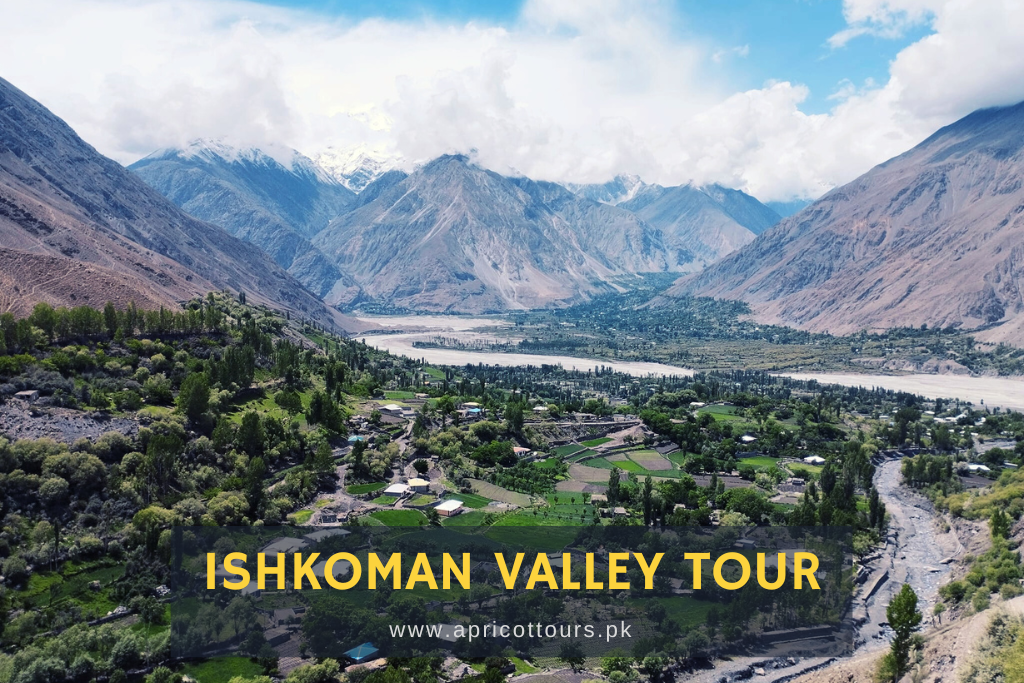General
Ishkoman Valley Tour (2025-26)
Join the Ishkoman Valley Tour to discover the tranquil beauty of one of Pakistan’s most secluded and lovely regions. Nestled between towering mountains, this journey provides breathtaking scenery, charming communities, and a one-of-a-kind opportunity to discover northern Pakistan’s pristine beauty. Explore the hidden gems of Ishkoman Valley and immerse yourself in its natural beauty.
In addition to this tour, we offer a variety of other tour packages in Gilgit Baltistan. Please see the table below for more details.
Itinerary – Ishkoman Valley Tour
The itinerary for the Ishkoman Valley Tour is given below.
Day 02: Fly to Gilgit
On this Day
Arrive at Gilgit, either by air or land. Once you've checked into your hotel, take some time to relax and acclimate to the altitude. Depending on your arrival time, you might visit Gilgit's local markets or take a stroll along the Gilgit River. The evening provides an opportunity to adapt and prepare for the impending excursion. Stay overnight at a hotel in Gilgit.
Day 03: Gilgit to Gahkuch
On this Day
After a full breakfast at your accommodation, take a picturesque journey to Gahkuch, the seat of Ghizer District, located roughly 90 kilometers west of Gilgit. The ride, which lasts around three hours, provides breathtaking views of the Gilgit River, turquoise waters, brown mountains, and green spots. After arriving in Gahkuch, have a local lunch and then tour the town, taking in its distinct character and surrounding natural beauty. In Gahkuch, stay overnight in a local hotel or guesthouse.
Day 04: Gahkuch to Ishkoman Valley
On this Day
Following an early breakfast, proceed to Ishkoman Valley, which is approximately 50 kilometers north of Gahkuch. The well-maintained road makes the journey enjoyable and simple. When you get to Ishkoman, go around the village and soak in the peaceful atmosphere. You'll come across a few small trails and tight bridges, giving an element of excitement to your stay. Continue to the secluded settlement of Hotulti, your final stop before entering no man's land. As the day fades, return to Ishkoman for an overnight stay, either camping in the valley or returning to Gahkuch, depending on your preferences and available lodgings.
Day 05 - Drive to Phandar Valley
On this Day
Drive to Phander. The Phander Valley is a magnificent place to be and a real paradise on Earth. Trout is well-known as a popular fish. People are drawn to Phander for its natural beauty. It is situated in the northwest region of Gilgit. There are various good and reasonably priced hotel alternatives along the main Gilgit-Chitral route. The Gilgit River has beautiful blue water at this location. The mountains around the lakes are high. There are four huge lakes, the largest being Phander Lake. As the river enters the valley, it splits into several smaller streams before joining again as it exits. Phander is made up of Shamarn, Chachi, Dalimal, Gulagmuli, and Teru.Khowar is the major language spoken in the Phander Valley.
Day 06: Yasin Valley
On this Day
Drive to Yasin Valley, Yasin Valley is located in the northern portion of Gupis Yasin district, is sometimes referred to as the "land of martyrs." This valley is around 148 kilometers from Gilgit. Yasin's people are committed, honest, courageous, and forthright. Burushaski and Khowar are two of the most widely spoken languages here. Hundur Yasin was the owner of Hawaldar Lalak Jan Shaheed, who got the Pakistani military's highest decoration, the Nishan-e-Haider, for his bravery during the Kargil campaign. The Yasin Valley is home to villages including Gindai, Bajyot, Chaliharang, Thodas, Manich, Taus, Sultanabad, Huwalti, Thoi, Barkolti, Sandi, Darkot, Hundur, Qurqalti, and Gojalti. Yasin is connected to Chitral and Wakhan by the Darkot Pass. The main attractions include Makkoli, Darkut, and the Mudori fortress. This region produces a lot of apricots, vegetables, and apples. Yasin's population is mostly brusho, although there are also migrants from other parts of the country.
Day 07: Return to Gilgit
On this Day
After breakfast, begin your journey back to Gilgit. Enjoy the picturesque journey and think on the amazing views you've seen. When you get to Gilgit, you may have some free time to explore the local area or go shopping. Depending on your trip intentions, take a flight home or continue your adventure by car. This completes your immersive and breathtaking tour of Ishkoman Valley.
Day 08: Fly to Islamabad
On this Day
On this day the participants will take a flight from the airport in Gilgit to Islamabad airport. You will have a good time to relax at the hotel in Islamabad.
The domestic flights sometimes get canceled due to weather conditions. In case of flight cancellation, you will drive to Chilas overnight. It takes eight to ten hours by vehicle.
Day 09: Fly to home country
On this Day
Dates & Cost – Ishkoman Valley Tour
All seasons are considered good for the Ishkoman Valley Tour. Considering the inflow of tourists all year round, our dates are open throughout the year and your bookings will be 100% guaranteed even if you are a single traveler. Our prices and dates for this tour (all seasons) are given below.
| Season | Months | Tour Start Date | Price Per Person (USD) | Minimum Travellers Required | Register |
|---|---|---|---|---|---|
| Winter | Mid-November to February, 2025 | Daily | 1200 | 1 pax | BOOK NOW |
| Spring | March to May, 2025 | Daily | 1200 | 1 pax | BOOK NOW |
| Summer | June to Mid- September, 2025 | Daily | 1200 | 1 pax | BOOK NOW |
| Autumn | Mid-September to Mid November, 2025 | Daily | 1200 | 1 pax | BOOK NOW |
| Season | Months | Tour Start Date | Price Per Person (USD) | Minimum Travellers Required | Register |
Holiday Information
- Pickup from hotel or vacation rental before sightseeing
- Drop at hotel or vacation rental after sightseeing
- Guided sightseeing tour according to itinerary above
- Map (hard copy)
- Licensed professional guide (english speaking)
- SUV/mini-van/car (depending on number of people)
- Driver
- All entry/admission tickets
- Bottled water in car (fair usage policy)
- Toll & parking fees
- Drop after 10 pm (Drivers & Guide's working hours end at 10pm)
- Gratuities/tips for guides/drivers, etc
- Meals, snacks and drinks (our guide will make recommendations after consultation with guests)
- Accommodation (can be arranged at additional cost according to your budget)
- Personal travel insurance (Recommendation/Rescue Partners: Global Rescue)
- Visa to Pakistan (supporting documents can be offered if requested for multiday tours)
- Refunds in case of early tour windup/closure due to any reason
- Anything not mentioned in inclusions
Photo Gallery – Ishkoman Valley Tour
Overview – Ishkoman Valley Tour
The Ishkoman Valley Trip is an off-the-beaten-path trip through one of northern Pakistan’s lesser-known yet breathtakingly beautiful locations. Ishkoman Valley, located approximately 50 kilometers north of Gahkuch, the seat of Ghizer District, is a hidden treasure along the route that connects Gilgit and Chitral via the famed Shandur Top. The ride from Gilgit to Gahkuch is breathtaking, with the Gilgit River leading you through a scene of turquoise waters, towering brown mountains, and lush green spots that resemble oases.
As you travel from Gahkuch to Ishkoman, you’ll be pleasantly delighted by the well-kept blacktop road with little climb, making the journey simpler than expected. The valley provides a calm escape with breathtaking vistas, even though the infrastructure is still in development and tourism resources are limited. When you approach the settlement of Ishkoman, you may come across some narrow dirt lanes and tight bridges that add to the experience. The community is tucked in a tranquil environment, surrounded by rocky mountains and running water systems. Those who enjoy exploring might continue to Hotulti, the last settlement before entering the region’s isolated and pristine environment.
For the daring, the excursion can be continued beyond Ishkoman to the breathtaking Karamber (Qaramber) Lake. This beautiful high-altitude lake can only be reached by trekking, which takes many days and requires the coordination of porters and guides. The walk provides a more immersive view of the region’s untamed nature, with evenings spent in tents beneath the stars.


















